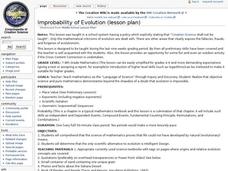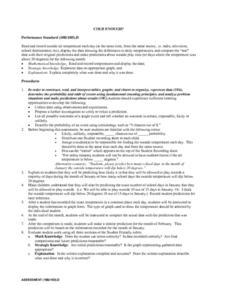Curated OER
Probability: The Study of Chance
Students conduct an experiment, determine if a game is fair, and collect data. They interpret data, then display line graph. They conduct analysis of game for probability.
Curated OER
Probability: the Study of Chance
Students experiment to determine if a game is fair, collect data, interpret data, display data, and state and apply the rule for probability. Students use a simple game for this experiment.
Curated OER
Teaching with Collections
Students examine collections. In these real-world collections lessons, students examine and describe buttons and shells. Students will then sort, classify, and graph items according to various indicated descriptors.
Curated OER
Genes Count
Students view a video that reviews Mendelian genetics. They discuss the Hardy-Weinberg Law and use Popsicle sticks to simulate genetic variations and ratios in offspring.
Curated OER
Improbability of Evolution
Students disprove evolution. In this science lesson, students disprove evolution by attempting to prove that creation is the way it all began. They use the improbability that evolution could exist and expose its fallacies, frauds and...
Curated OER
Activity: Gummy Bear Genetics
Who's your Daddy ... and Mommy for that matter? Given a first-generation group of gummy bear offspring, young scientists must determine which bears are their parents. An activity worksheet covers the differences in genotypes and...
NOAA
Technology I
Isn't technology great? The 12th installment of a 23-part NOAA Enrichment in Marine sciences and Oceanography (NEMO) program introduces technology that marine scientists use. Pupils take part in an activity using conductivity,...
Curated OER
Cold Enough?
Students read and record temperatures and display the data. They represent the temperatures on an appropriate graph and explain completely what was done and why it was done. Students display the data showing differences in the daily...
Curated OER
Atomic Theory
In this atomic theory learning exercise, learners use Planck's constant, Rydberg constant, and Avogadro's number to complete 20 multiple choice questions.








